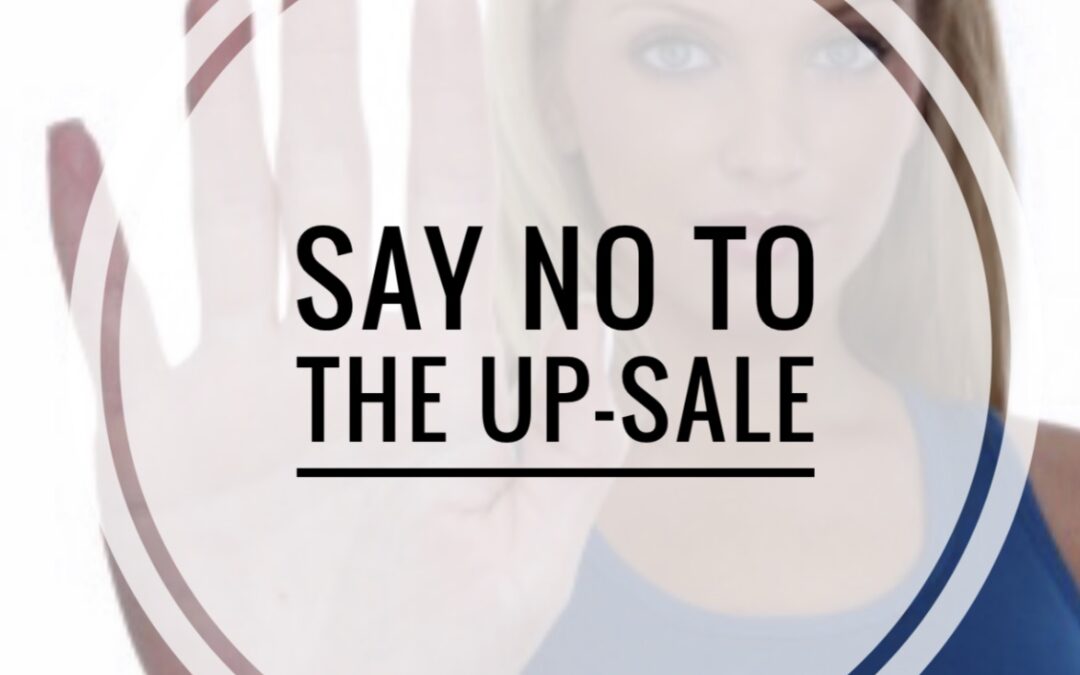Up-selling is a common practice in marketing, but it doesn’t help your health or weight loss goals at all. Just say no to the up-sale of bigger food portions.

Marketing strategies to get consumers to buy more are everywhere. That includes the sale of foods. On common strategy is trying to up-sale. That is, trying to get you to buy more, for what appears to be less. In the food industry, this is buying in bulk, or choosing the combo meal over the sandwich alone. When grocery shopping for a family, buying the larger package can save you money. When buying a meal for yourself, however, it can cause you to over-eat.
Is eating too much really a deal?
My Recent Experience
A few months ago, I stopped at a popular sandwich shop after finishing a 150 mile bike ride. I was starving! I ordered a 6” turkey sub, loaded with veggies and topped with pepper. The man behind the counter asked if I wanted double meat on my sandwich.
“No”, I replied. I don’t want double meat.
Now, I understand that restaurants are trying to make a buck and that by selling me additional protein for my sandwich will make them more money. That initial question isn’t what struck me. It’s what happened after I declined the “double meat” that got me.
The gentleman further explained that they were running a special. If I ordered double meat, I would get a free cookie.
WHAT? It was not enough that I declined the extra meat. They had a second strategy to get me to over eat – a free cookie. My dietitian mind instantly went to the extra food. If purchased the extra 120 calorie meat, I would get an extra 220 calorie cookie, for free. My mouth dropped. I declined and was quite disturbed.
Up-Selling Is A Marketing Strategy
This type of marketing is everywhere. Buy one get one, buy one free or buy one get half off. It’s also the same strategy used to sell combo or value meals. It happens on-line, too. When companies encourage you to add more to your cart as you’re checking out. Restaurants and food companies attempting to “up-sell” foods that are cheap, as a way to make an extra buck. It’s not that much extra money to stuff a few extra French fries into a container. But, consumers perceive it as a value. But is it?
Think Before You Say Yes To The Up-Sale Of More Food
When this happens to you, take time to process what you are about to get more of – especially if it’s low-quality food. you struggle with maintaining appropriate portions, having more food in front of you will likely lead to eating it. Do you really want more food? Or, maybe the better question is, do you really need more? If you’re sharing a meal, or have the discipline to take it home for another day, it might be worth it. But, if it’s only going to tempt you to eat more than you need, it’s probably best to pass.
Practice Saying No To The Up-Sale Of Bigger Food Portions
Saying no to the up-sale of bigger food portions isn’t easy to do. It takes practice. It’s the same type of practice it takes to stop eating when you are full. But, to prevent yourself from over-eating, practicing saying no. Doing so also helps to cut-back on food waste. Taking extra food, even if you choose not to eat it, can end up in the garbage can.
The more you practice saying no, the easier it becomes You’ll feel good about the control you maintained, and your health will thank you, too.


 Hi, I’m Heather – a registered dietitian, busy mom, consultant, adventure junkie and travel addict who has mastered living healthy on the go. My blog is where I share simple recipes and healthy living tips to help and inspire others to live their best life.
Hi, I’m Heather – a registered dietitian, busy mom, consultant, adventure junkie and travel addict who has mastered living healthy on the go. My blog is where I share simple recipes and healthy living tips to help and inspire others to live their best life.
I am seriously so impressed! Watched your video and you have such poise and grear articulation. It’s always been my dream to start my own private practice someday but I wouldn’t even know where to start! Maybe we can chat one of these days!
Best of luck
Rachael RD LDN